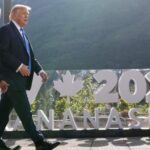In an unprecedented shift that signals growing economic sovereignty concerns, several Indigenous-owned Canadian businesses have begun suspending exports to the United States, despite generations of cross-border trade relationships that predate modern national boundaries. This development comes at a critical juncture for Indigenous economic development in Canada, where First Nations enterprises have been establishing increasingly sophisticated business networks both domestically and internationally.
The decision to pause U.S. exports stems from a complex interplay of regulatory uncertainties, sovereignty questions, and evolving trade dynamics. According to industry observers, these businesses are reassessing their position in cross-border commerce amid heightened scrutiny of Indigenous trading rights and ongoing discussions about the implementation of the United States-Mexico-Canada Agreement (USMCA).
“What we’re witnessing is Indigenous businesses taking proactive steps to protect their economic interests while larger questions about cross-border Indigenous commerce are resolved,” said Eleanor Whitehawk, an economic policy analyst specializing in Indigenous trade relations. “Many of these trade relationships existed long before current borders were established, and there’s a legitimate concern about preserving those historic rights.”
The affected enterprises span multiple sectors including traditional arts and crafts, agricultural products, sustainable forestry, and technology services. Particularly impacted are businesses in communities whose traditional territories straddle the Canada-U.S. border, such as the Mohawk, Blackfoot, and Coast Salish Nations.
The economic implications extend beyond Indigenous communities. Data from Indigenous Services Canada indicates that Indigenous businesses contribute approximately $30 billion annually to the Canadian economy. A significant reduction in exports could potentially disrupt supply chains on both sides of the border, especially in sectors where Indigenous producers have established specialized niches.
This development occurs against the backdrop of ongoing efforts to implement the United Nations Declaration on the Rights of Indigenous Peoples (UNDRIP) in Canadian law, which recognizes Indigenous peoples’ rights to maintain economic systems across international borders they have traditionally crossed.
For businesses like Northern Shield Forestry, a First Nations-owned sustainable timber operation in British Columbia, the decision to temporarily halt U.S. exports wasn’t made lightly. “We’ve built relationships with buyers in Washington and Oregon over decades,” explained company director Thomas Bearwood. “But we need clarity on how our treaty rights interact with current trade regulations before we can confidently resume those relationships.”
Canadian trade officials have acknowledged the situation and indicated that discussions are underway with Indigenous business representatives and their American counterparts to address concerns. The Canadian Council for Aboriginal Business has called for clearer guidelines that respect both modern trade frameworks and historic Indigenous trading rights.
As these complex negotiations unfold, many Indigenous business leaders emphasize that the export pause is temporary—a strategic repositioning rather than a permanent withdrawal from international markets. Several communities are using this period to strengthen domestic supply chains and explore new markets beyond North America.
The situation raises profound questions about the intersection of Indigenous sovereignty and international trade: In an era of reconciliation and economic decolonization, how can modern trade frameworks better accommodate the distinct rights and economic practices of Indigenous nations whose territories and trading relationships have historically transcended contemporary borders?























